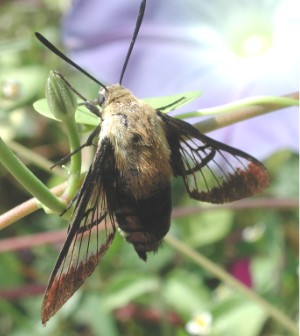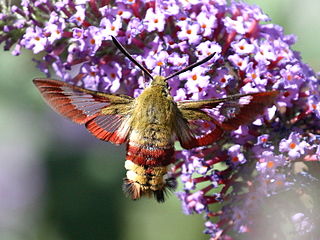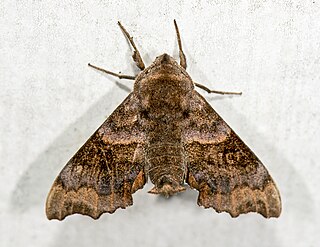
Hemaris is a genus of sphinx moths in the subfamily Macroglossinae, which is native to the Holarctic. Their main host plants are herbs and shrubs of the teasel and honeysuckle families. Moths in genus Hemaris are known collectively as clearwing moths or hummingbird moths in the US and Canada and bee hawk-moths in Britain. The related Old World hummingbird hawk-moths, genus Macroglossum, are similar in appearance and habits. Both genera have tails that are provided with an expansile truncated tuft of hairs, but only Hemaris has the disc of the wings transparent, as these scales are dropped soon after eclosion.

Cechenena helops is a moth of the family Sphingidae first described by Francis Walker in 1856. It is found in Malaysia, Indonesia, the Philippines, Nepal, north-eastern India, Thailand, south-western China and Vietnam.

Polyptychus affinis is a moth of the family Sphingidae first described by Walter Rothschild and Karl Jordan in 1903. It is known at elevations up to 6,000 feet (1,800 m) in forests from Sierra Leone to the Congo, Uganda and western Kenya.

Hemaris tityus, the narrow-bordered bee hawk-moth, is a moth of the family Sphingidae which is native to the Palearctic.

The fabulous green sphinx moth or fabulous green sphinx of Kauai is a species of moth in the family Sphingidae. It is monotypic within the genus Tinostoma. It is endemic to the Hawaiian Islands and was thought to be extinct until it was rediscovered in 1998. The genus was erected by Walter Rothschild and Karl Jordan in 1903 and the species was first described by Edward Meyrick in 1899.

Hemaris fuciformis, known as the broad-bordered bee hawk-moth, is a moth of the family Sphingidae.

Anambulyx is a monotypic moth genus in the family Sphingidae erected by Walter Rothschild and Karl Jordan in 1903. Its only species, Anambulyx elwesi, or Elwes' pink-and-green hawkmoth, was first described by Herbert Druce in 1882.

Akbesia is a monotypic moth genus in the family Sphingidae erected by Walter Rothschild and Karl Jordan in 1903. Its only species, Akbesia davidi, the pistacia hawkmoth, was first described by Charles Oberthür in 1884. It is known from southern Turkey, northern Syria, northern Israel, western Jordan, south-eastern Turkey, north-eastern Iraq, south-eastern Georgia, northern Iran, eastern Afghanistan and Iranian Beluchistan. It may also occur across Azerbaijan, the Alborz Mountains of northern Iran, the Zagros Mountains of western and southern Iran, and northern Afghanistan. It often occurs in large numbers at certain sites in rocky, hilly areas supporting scattered trees and shrubs of Quercus, Olea, Ceratonia and Pistacia.

Apocalypsis velox is the only species in the monotypic moth genus Apocalypsis in the family Sphingidae. The genus erected by Walter Rothschild and Karl Jordan in 1903. The species was described by Arthur Gardiner Butler in 1876, and is found from north-eastern India and from south-western China to northern Vietnam.

Hyles nervosa, the Ladakh hawkmoth, is a moth of the family Sphingidae. The species was first described by Walter Rothschild and Karl Jordan in 1903. It is found in eastern Afghanistan, northern and western India, northern Pakistan and the extreme west of the Xizang province and Tibet.

Nephele oenopion is a moth of the family Sphingidae. It is known from Africa.

Rhagastis confusa, the indistinct mottled hawkmoth, is a moth of the family Sphingidae.

Hemaris ducalis, the Pamir bee hawkmoth, is a moth of the family Sphingidae. It is known from the mountains of south-western Xinjiang in China, the western Tian Shan, southern and eastern Kazakhstan up to the Altai Mountains, western Mongolia, southern Uzbekistan, Kyrgyzstan, Tajikistan, northern Afghanistan and Pakistan.

Hemaris ottonis is a moth of the family Sphingidae. It is known from the Russian Far East, north-eastern China and the Korean Peninsula.
Hemaris syra, the broad-bordered bee hawkmoth, is a moth of the family Sphingidae. The species was first described by Franz Daniel in 1939. It is known from southern and eastern Turkey, the western Zagros Mountains and northern Alborz Mountains of Iran, the Kopet Dag mountains of Turkmenistan, western Jordan, and northern Israel. The habitat consists of open remnants of former woodland, especially where Lonicera grows through and over low shrubs. It occurs at around 1,000 meters altitude in southern Turkey and from 1500 to 1600 meters in northern Israel.

Hemaris rubra, the Kashmir bee hawkmoth, is a moth of the family Sphingidae. The species was first described by George Hampson in 1893. It is known from a number of valleys in Kashmir. The habitat consists of flower-rich meadows at around 2,500 meters.
Hemaris molli is a moth of the family Sphingidae. The species was first described by Ulf Eitschberger, Günter C. Müller and Vasiliy D. Kravchenko in 2005. It is known from Jordan.

Cypoides chinensis is a species of moth of the family Sphingidae first described by Walter Rothschild and Karl Jordan in 1903.

Clanis titan, the scarce velvet hawkmoth, is a species of moth of the family Sphingidae.

















